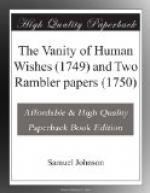When we approach Johnson’s poetry, the revolution of taste becomes a more acute consideration. It seems very nearly impossible to compare or contrast eighteenth-century poetry and that of the twentieth without wilfully tipping the scales in one direction or the other, judgment in this area being so much influenced by preference. But let us begin with titles. For a start, let us take, from a recent Pulitzer Prize-winner: “The Day’s No Rounder Than Its Angles Are”, and “Don’t Look Now But Mary Is Everybody”; from another distinguished current volume, these: “The Trance”, “Lost”, “Meeting”; from another, “After This, Sea”, “Lineman Calling”, “Meaning Motion”; and from a fourth, “Terror”, “Picnic Remembered”, “Eidolon”, and “Monologue at Midnight”. Here are individual assertions, suggestive of individual ways of looking at things; here are headings that signalize particular events in the authors’ experience,—moments’ monuments. Beside them, Johnson’s title, “The Vanity of Human Wishes”, looks very dogged and downright.
Titles are not poems but they have a barometric function. The modern titles cited above are evocative of a world with which, for the past century and a half, we have been growing increasingly familiar. This air we are accustomed to breathe: it requires no unusual effort of adjustment from us. We readily understand that we are being invited to participate in a private experience and, by sharing it, to help in giving it as much universality as may be. It is by no means easy for readers of to-day to reverse the process, to start with the general and find in it their personal account. We are more likely to feel a resentment, or at least a prejudice, against the writer who solicits our attention to a topic without even the pretense of novelty.
Johnson’s generation would have found it equally hard to see the matter from our point of view, or to allow that the authors of the poems named above were being less than impudent or at best flippant in thus brazenly obtruding their private experience, undisguised, before the reader. We ought, moreover, to realize that in this judgment they would have the suffrages of all previous generations, including the greatest writers, from classical times down to their own. It is we who are singular, not they. Quite apart from considerations of moral right or wrong, of artistic good or bad, it obviously, therefore, behooves us to try to cultivate a habit of mind free from initial bias against so large a proportion of recorded testimony.




